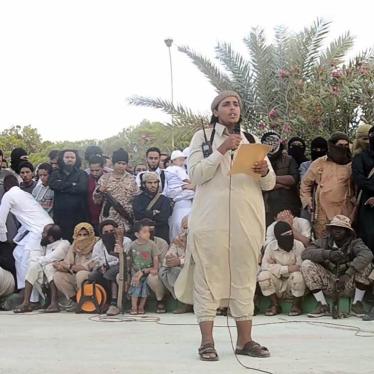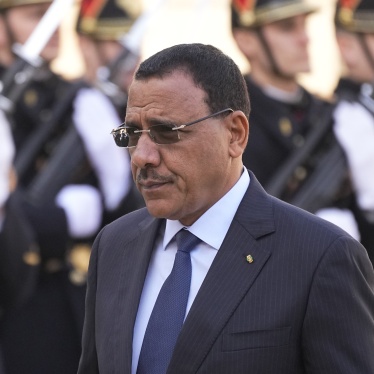(Washington, DC) – The United States government should ensure that a terrorism suspect apprehended in Libya is promptly brought before a judge and given access to a lawyer in accordance with international human rights law, Human Rights Watch said today. The US says it is holding Abu Anas al-Libi under the “laws of war,” raising concerns about his capture and treatment.
A US-led operation apprehended al-Libi in the Libyan city of Tripoli on October 5, 2013. The United States is detaining him on a US Navy ship in the Mediterranean Sea, according to media reports. The US government in 2000 named him and 20 others in an indictment for his alleged role in the August 1998 bombings of US embassies in Kenya and Tanzania. The attacks killed 224 people and injured thousands more. Five of the defendants are serving life sentences after conviction in US federal court; three more are facing trials. The Defense Department has also stated that al-Libi is being detained under the laws of war in connection with other alleged Al-Qaeda attacks in Saudi Arabia, Yemen, Somalia, and Kenya.
“Whatever the legal basis for al-Libi’s apprehension in Libya, the US needs to respect his rights so that he can be fairly tried in a civilian court,” said Laura Pitter, senior counterterrorism researcher at Human Rights Watch. “That means ensuring he gets a lawyer during any questioning and that he is promptly brought before a judge and charged.”
With respect to al-Libi’s apprehension in Libya, the US government should show that there is no functioning justice system in the country that would have allowed for al-Libi’s arrest and possible extradition in accordance with international due process requirements, Human Rights Watch said. Human Rights Watch has documented the many challenges facing the Libyan criminal justice system, including abuse in custody, denied access to lawyers, and the lack of judicial review.
The US government’s claim that it can legally hold al-Libi under the laws of war presupposes an ongoing armed conflict between the US and Al-Qaeda, Human Rights Watch said. In a May 23 speech at the National Defense University, President Barack Obama said, however, that the Al-Qaeda threat to the United States, while still real, consists of sporadic, isolated attacks, carried out by autonomous or loosely affiliated cells that can cause considerable loss of life. That description appears to fall short of the level of military operations that define an armed conflict under international law.
Were al-Libi a combatant with an armed group engaged in an armed conflict with the United States, he could only be interrogated without a lawyer for military intelligence purposes, and not in connection with alleged criminal wrongdoing.
Individuals apprehended in a conflict between a state and a non-state armed group or outside the context of an armed conflict altogether retain their rights to due process under international human rights law. This includes being promptly brought before a judicial authority, being charged with a criminal offense, and having access to legal counsel of one’s choosing.
Prolonged lack of access to an attorney or to family members would raise concerns about al-Libi’s treatment. The US should grant an independent humanitarian organization immediate access to al-Libi, Human Rights Watch said.
“The US government complicated the 9/11 cases by mistreating the suspects and then prosecuting them in deeply flawed military commissions,” Pitter said. “The Obama administration should make sure it doesn’t repeat past mistakes with al-Libi, so that he can be prosecuted to the full extent of the law.”






